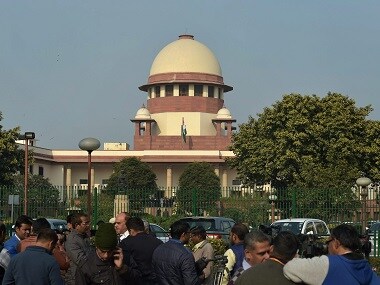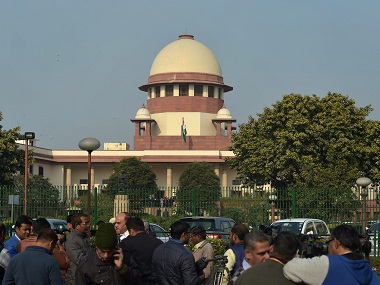The Centre has filed a written submission before the Supreme Court detailing its stance on the alleged dilution of the SC/ST (Prevention of Atrocities) Act. Insisting that the court’s verdict dealt with a very sensitive issue, it said that the ruling has caused anger, unease and a sense of disharmony in the country. It further said that there is a separation of powers between legislature, executive and judiciary and it is inviolable. It said that the verdict, instead of filling gaps in SC/ST Act, resorted to “judicial legislation” as it diluted the provisions of the Act, resulting in great damage to the country. In his written submission, Attorney-General KK Venugopal said, “It is submitted that this judgement has diluted, for the reasons stated, the provisions of the Atrocities Act read with the Code, resulting in great damage to the country.” The Centre also said that the “confusion” created by the apex court verdict may have to be corrected by reviewing the judgment and recalling the directions issued by the top court. “Bland statement that ‘power to declare law carries with it, within the limits of duty, to make law when none exists’ is wholly fallacious because we live under a written Constitution of which separation of powers between the legislature, the executive and the judiciary is the very basic structure and is inviolable,” it said. SC had earlier declined to stay ruling Last week, the Supreme Court had declined to stay its ruling, which activists say has diluted the Act, as it had asserted that it wanted to protect innocent people from being punished. A bench of Justices Adarsh Kumar Goel and Uday Umesh Lalit said compensation can be paid to victims alleging atrocities under the Act even without a FIR being registered. The bench had said this on a plea by the Centre seeking recall of its 20 March order where the apex court had said that no arrest would be affected on a complaint under the Act without an inquiry. [caption id=“attachment_4412023” align=“alignleft” width=“380”] File image of Supreme Court. PTI[/caption] Refusing to budge on its five directions issued on 20 March, the court had said: “We are not against the law or its implementation” and the directions in no way diluted the law but were aimed to protect the innocent people from being punished. It describe its direction for preliminary inquiry before an FIR is registered on a complaint as “filter”. “People who are agitating have not read the order. There is a lot of hearsay,” Justice Goel had observed. The court had said that all they have done is to read the Constitution’s Article 21 — guaranteeing protection of life and personal liberty — in the act and that should happen with every statute. When the attorney-general had argued that there is a tremendous amount of deprivation, discontent and agitation in SC/ST community who had been oppressed for thousands of years, Justice Goel observed, “We are not concerned about what is happening outside this court. Those agitating on streets may not have even read our judgment. Vested interests are also involved some time. We are only concerned about innocent people being put behind bars. We are not against the Act at all. But innocents can’t be punished on unilateral version. Why does government want people to be arrested without verification.?” As Venugopal argued why SC/ST people will implicate anyone, the bench had said: “Our approach is to protect innocent people… If there is an unverifiable allegation against an official, how will he function? How will the A-G function?” Having clarified that non-registration of FIR would not come in the way of grant of compensation and its direction of preliminary examination in no way comes in the way of registering cases under penal offences and other statues, the court had given two days to different parties to the case to file written submissions and three days to file rejoinders as it had directed the next hearing after two weeks. With inputs from agencies
File image of Supreme Court. PTI[/caption] Refusing to budge on its five directions issued on 20 March, the court had said: “We are not against the law or its implementation” and the directions in no way diluted the law but were aimed to protect the innocent people from being punished. It describe its direction for preliminary inquiry before an FIR is registered on a complaint as “filter”. “People who are agitating have not read the order. There is a lot of hearsay,” Justice Goel had observed. The court had said that all they have done is to read the Constitution’s Article 21 — guaranteeing protection of life and personal liberty — in the act and that should happen with every statute. When the attorney-general had argued that there is a tremendous amount of deprivation, discontent and agitation in SC/ST community who had been oppressed for thousands of years, Justice Goel observed, “We are not concerned about what is happening outside this court. Those agitating on streets may not have even read our judgment. Vested interests are also involved some time. We are only concerned about innocent people being put behind bars. We are not against the Act at all. But innocents can’t be punished on unilateral version. Why does government want people to be arrested without verification.?” As Venugopal argued why SC/ST people will implicate anyone, the bench had said: “Our approach is to protect innocent people… If there is an unverifiable allegation against an official, how will he function? How will the A-G function?” Having clarified that non-registration of FIR would not come in the way of grant of compensation and its direction of preliminary examination in no way comes in the way of registering cases under penal offences and other statues, the court had given two days to different parties to the case to file written submissions and three days to file rejoinders as it had directed the next hearing after two weeks. With inputs from agencies
'Supreme Court's ruling on SC/ST Act caused great damage to country': Centre files written submission
FP Staff
• April 12, 2018, 14:01:00 IST
The Centre has filed a written submission before the Supreme Court detailing its stance on the alleged dilution of the SC/ST (Prevention of Atrocities) Act.
Advertisement
)
End of Article